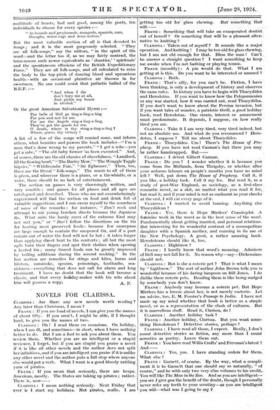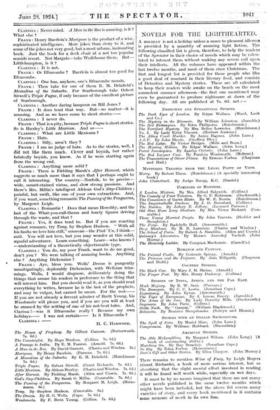NOVELS FOR CLARISSA.
CLARISSA Are there. any new novels worth reading ? Any later than Christmas, I mean ?
FRANK : If you are fond of novels, I can give you the names of about fifty. If you aren't, I might be able, if I thought hard, to give you the names of two.
CLARISSA : Oh ! I read them on occasions. On holiday, when I am ill, and sometimes—in short, when I have nothing better to do. But I am a fool to ask you about them. You review them. Whether you are an intelligent or a stupid reviewer, I forget, but if you are stupid you praise a novel if it is like all other novels and the author does not split her infinitives, and if you are intelligent you praise if it is unlike any other novel and the author puts a full stop where anyone else would put a verb. What I want is a good bloody rattling yarn of pirates.
FRANK : If you mean that seriously-, there are heaps. American, mostly. The States are taking up pirates ; rather. There is, now---•• CLARISSA : I mean nothing seriously. Next Friday that ever is I start my holidays. Not pirates, really. I. am
getting too old for glass chewing. But' something that . -
FRANK : Something that will take an exasperated dentist out of herself ? Or something that will be a pleasant alter-. native to knitting ?
CLARISSA : Taken out of myself ? It sounds like a major operation. And knitting ! I may be too old for glass chewing, but. I am not old enough for that. Bless the man ! Can't, he answer a straight question ? I want something to keep me awake when I'm not bathing or playing tennis.
FRANK (moodily) : A pin would do that. What I am getting at is this. Do you want to be interested or amused ? CLARISSA. : Both.
FRANK : That's silly, for you can't be. Fiction, I have been thinking, is only a development of history and observes the same rules. In history you have, to. begin with Thucydide,.s and HerodotRs. If you want to know how the Peloponnesian or any war started, how it was carried out, read Thucydides, If you don't want to know about the Persian invasion, but if you want tales- of wonder, a- patriotic thrill, a good holiday book, read Herodotus. One strain, interest or amusement must predominate. It depends, I suppose, on how really tired you are.
CLARISSA : Take it- I- am very tired, very tired indeed, but not an absolute ass. And what, do you recommend ? Hero- - dotus, I suppose ? Tell me about Thucydides.
FRANK : Thucydides. Um ! There's The House of Pro- phecy. If you have not read Cannan's last three you may be rather handicapped. But----• CLARISSA: : I detest Gilbert Carman.
FRANK : Do you ? I wonder whether it is because you come from the Midlands, from Thrigsby, or whether after your arduous labours on people's mouths you have no mind left ? Well, put down The House of Prophecy. Call it, if you like, a holiday task. Call it my fee. But read it, as a study of post-War England, as sociology, as a first-class romantic novel, as a skit, no matter what you read it for, _ but read it, and if your mind-is not as sunburnt as your cheeks at the end, I will eat every page of it.
CLARISSA : I wanted to avoid tanning. Anything else Thueydidean ? FRANK : Yes, there is Hope Mirrlees' Counterplot. A feminine work in the worst as in the best sense of the word. Fundamentally about getting married, and personal relations. But interesting for its wonderful contrast of a cosmopolitan daughter with a Spanish mother, and cunning in its use of the New Psychology. A good, a rather amazing book. Herodoteans should like it, too.
CLARISSA : Highbrow ?
FRANK : I hardly know that word's meaning. Admirers of Dell may not fall for it. No reason why—say—Dickensians should not.
CLARISSA : But is she a coterie pet ? That is what I mean by " highbrow." The sort of author John Brown tells you is wonderful because of his daring lampoon on Bill Jones. I do dislike these coterie pets. Reading them is like being nudged by somebody you- don't know.
FRANK : Anybody may become a coterie pet. But Hope Mirrlees has a breeze about her, is not merely esoteric. Let me advise, too, E. M. Forster's Passage to India. I have not made up my mind whether that book is better an a simple novel, or as a representation of the clash of cultures. But it is marvellous stuff. Read it, Clarissa, do I CLARISSA :, Another holiday task ?
FRANK : Another holiday, Clarissa. But you want some- thing Herodotean ? Detective stories, perhaps.?
CLARISSA : I have read all those, I expect. Really,A don't count detective stories as fiction, any more than I count acrostics as poetry. Leave them out.
FRANK : You have read Willis Crofts' and Freeman's latest ? And
: Yes, yes. I have standing orders for them. What else ?.
FRANK : Garnett, of course. By the way, what a compli- ment it is to Garnett that one should say so naturally, " of course," and he with only two very slim volumes to his credit. You will like The Man in the Zoo. And as you are intelligent— you see I give you the benefit of the doubt, though I personally never refer my teeth to your scrutiny—as you are intelligent you will—what was I going to say ? The House of Prophecy. By Gilbert Carman. (Butterworth. '7s. lid.) The Counterplot. By Hope Mirrlees. (Collins. 7s. 6d.) A Passage to India. By E. M. FOrster. (Arnold. 7s. 6d.,) A Man in the too. By David Garnett. (Chatto and Windus. 5s.) Mariposa. By Henry Baeilein. (Parsons. 7s. 6d.)
A Messaliva of the Suburbs. By E. M. Delafield. (Hutchinson. 7s. SoL)
Triple Fugue. By Osbert Sitwell. (Grant Richards. 7s. Gd.) LittleMexican. By Aldons Huxley. (Ghetto and Winding. 7s. Gd.) After -harvest. By -Fielding Marsh. (Allen and -Unwin. 7s. 6iL) 'God's Step-Children. By Sarah G. Mullin. (Constable. 7s. 6d.) -The =Passing of the Pengwerris. By Margaret -M. Leigh. (Heine-
rearm. -68.)
Tony. By Stephen Hudson. (Constable. 66.) The Dream. By H. G. Wells. (Cape. 7s. Gd.)
Woodsmoke. By F. Brett Young. (Collins. 7s. 6d.)
CL.,;RISSA : Never nruind. "A Man in the. Zoo is amusing, is ft ? What else ?
FRANK : Henry Baerlein's Mariposa is the product of a wise, .sophisticated intelligence. More jokeS: "than story to it and some of the jokes not very good, but a.most urbane, insinuating? book. Just the hook for a deck chair it a not too-popular seaside resort. Not Margaie—take Wodehouse there. But- Littlehainpton, is it ?
Cr-ouuss : It is not.
FRANK : Or Ilfracombe ? Baerlein is almost too good for Ilfracombe.
CL ARISSA : One has, anyhow, one's Ilfracombe moods.
FRANK : Then take for one of them E. M. Delafield's Medsalitta -of the 'Suburbs. For Scarborough take Osbert Sitwell's Triple Fugue, if only because of the excellent picture of Scarborough.
CLARISSA : Another daring lampoon on Bill Jones ? Feitigic : It does tend that way. But—no matter—it is amusing. And as we have come to short stories- 'CLARISSA : I never do.
FRANK : That is a-pity, because Triple Fugue is short-stories. So is Huxley's Little Mexican. And so- CLARISSA : What are Little Mexicans ?
FRANK : Hats.
CLARISSA : Silly, aren't they ?
FRANK : I am no judge of hats. As to the stories, well, I did not like them much. Clever and boyish, but rather belatedly boyish, you know. As if he were starting again from the wrong end.
CLARISSA : Anything more solid ?
FRANK : There is Fielding Marsh's After Harvest, which suggests so much more than it says that I perhaps ought to call it interesting. The country—Norfolk, to be precise— wide, sunset-stained vistas, and slow strong passions. And there's Mrs. Millin's intelligent African God's Step-Children ; painful, but swift, like one of your own extractions. And, if you want, something romantic The Passing of the Pengwerns, by Margeret Leigh.
cLABISSo : Romantic ! Does that mean Heredity, and the last of the What-you-call-thems and lonely figures driving through the waste, and that ?
FRANK : Yes, it does tend to. But if you are reacting against romance, try Tony, by Stephen Hudson. " With all his faults we love him still," someone—the Pink 'Un, I think- -said. You will not love, but you may wonder at this solid, squalid adventurer. Learn something. Learn—who knows ? —understanding of a theoretically objectionable type. CLARISSA : You do, my poor Frank, want to do me good, don't you ? We were talking of amusing books. Anything
else ? Anything Dickensian ?
FRANK : Aye, bless you. Wells' Dream is pungently unmitigatingly, deplorably Dickensian, with Wellsian trim- mings. Wells, I 'Would diagnose, deliberately doing the things that amuse his readers in preference to the thing that will interest him. But you •should read it, as you should read everything he writes, because he is the last of the prophets, and may be vulgar, but cannot be mean. For the rest— If you are not already a-fervent admirer of Brett Young, his Woodstnoke will please you, and if you are you will at least be amused by the setting -of One of -his not-best tales. And, Clarissa !—was it Ilfracombe really ? Because my own
holidays-- I was not certain Is it Ilfracombe ?
CLARISSA —
H. C. HARWOOD.















































 Previous page
Previous page